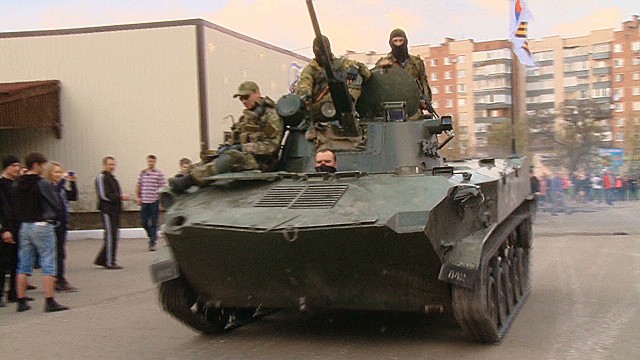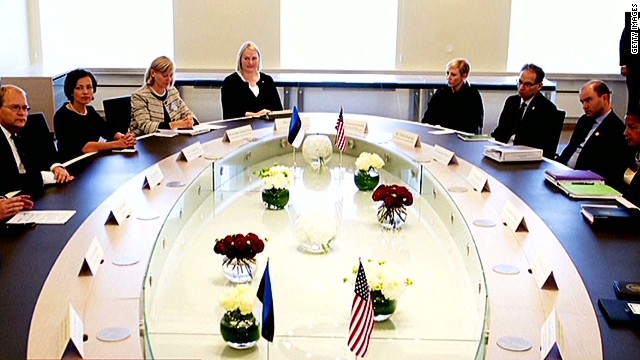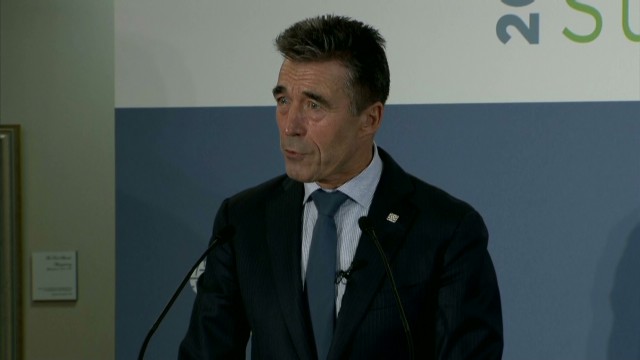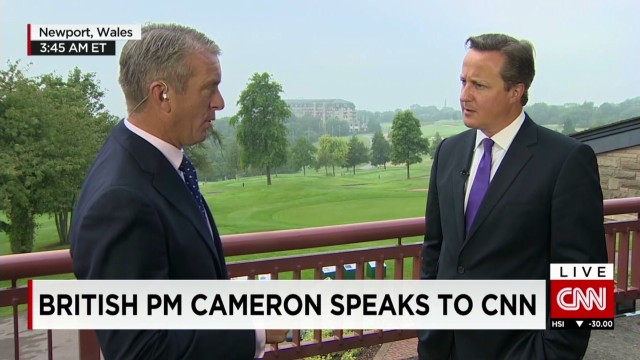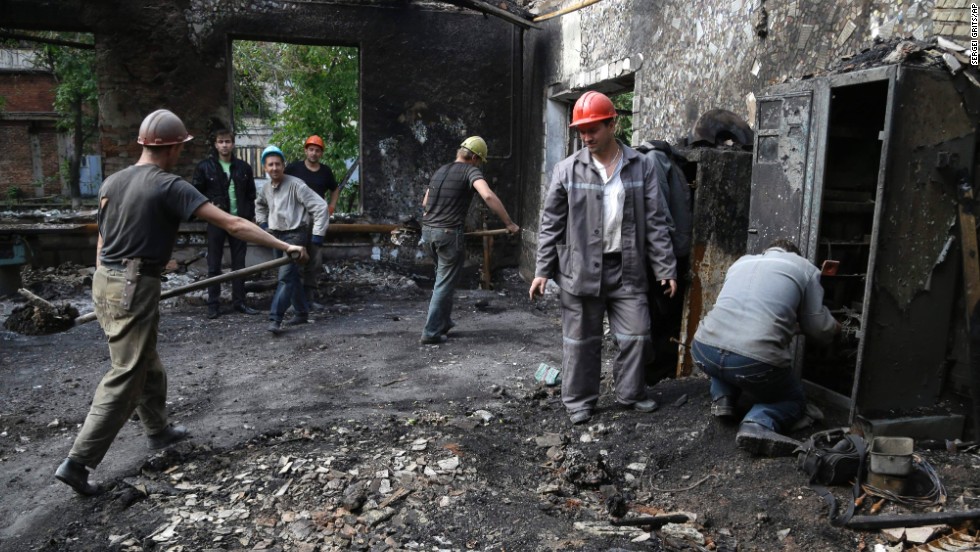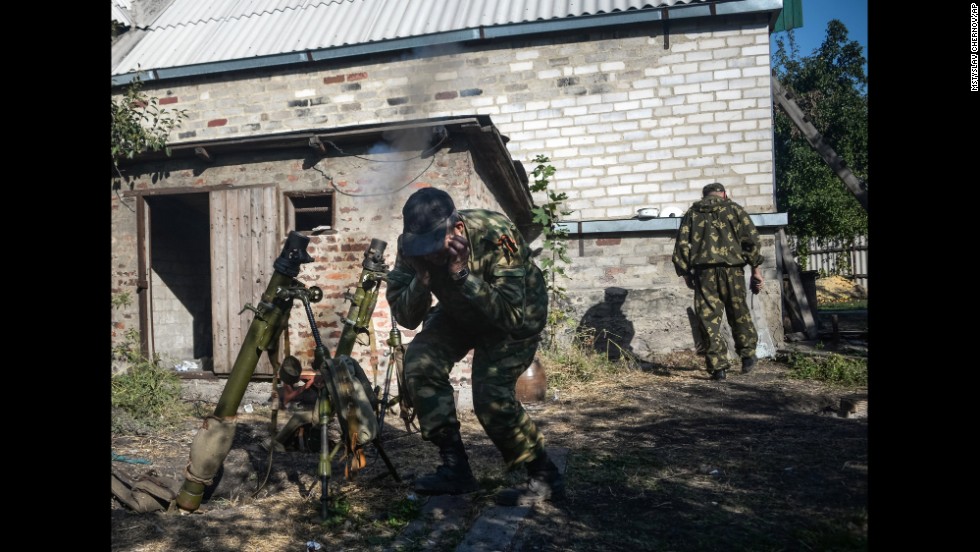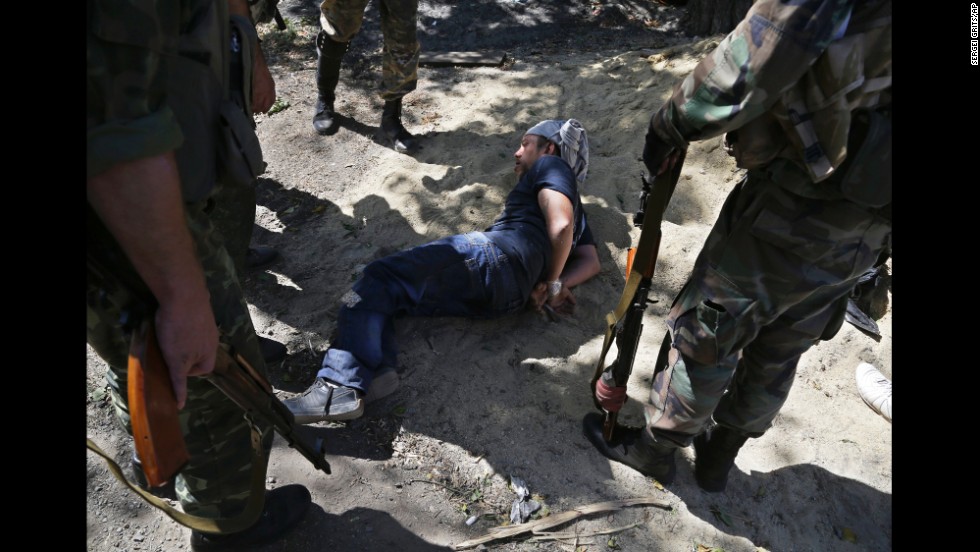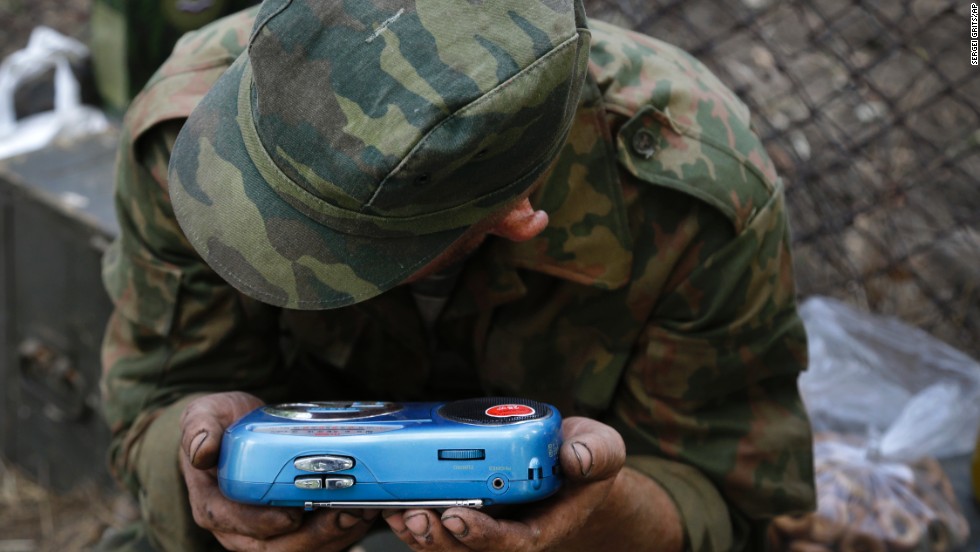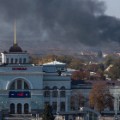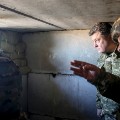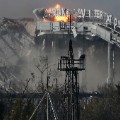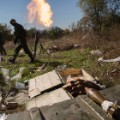Photos: Crisis in Ukraine
Crisis in Ukraine – Pro-Russian rebels fire artillery Tuesday, October 14, at Donetsk Sergey Prokofiev International Airport, which is on the outskirts of Donetsk, Ukraine. Fighting between Ukrainian troops and pro-Russian rebels in the country has left more than 3,000 people dead since mid-April, according to the United Nations.
Photos: Crisis in Ukraine
Crisis in Ukraine – Smoke rises behind the train station in Donetsk, Ukraine, during an artillery battle between pro-Russian rebels and Ukrainian government forces on Sunday, October 12.
Photos: Crisis in Ukraine
Crisis in Ukraine – Ukrainian President Petro Poroshenko, center, inspects Ukrainian army positions close to Donetsk on Friday, October 10.
Photos: Crisis in Ukraine
Crisis in Ukraine – The main terminal of Donetsk Sergey Prokofiev International Airport is hit by shelling during fighting between pro-Russian rebels and Ukrainian forces on Wednesday, October 8.
Photos: Crisis in Ukraine
Crisis in Ukraine – Pro-Russian rebels fire mortars toward Ukrainian positions near to the Donetsk airport on October 8.
Photos: Crisis in Ukraine
Crisis in Ukraine – A pro-Russian rebel walks past a burning house after shelling in the town of Donetsk, Ukraine, on Sunday, October 5.
Photos: Crisis in Ukraine
Crisis in Ukraine – An Ukrainian sniper aims his weapon at a checkpoint near Popasna, Ukraine, on Thursday, October 2.
Photos: Crisis in Ukraine
Crisis in Ukraine – Smoke rises from the area near the Donetsk airport after heavy shelling on October 2.
Photos: Crisis in Ukraine
Crisis in Ukraine – An injured man is transported at a hospital after shelling in Donetsk on Wednesday, October 1.
Photos: Crisis in Ukraine
Crisis in Ukraine – A woman injured at a bus station cries at a Donetsk hospital on October 1.
Photos: Crisis in Ukraine
Crisis in Ukraine – A pro-Russian rebel guards a damaged school in Donetsk on October 1.
Photos: Crisis in Ukraine
Crisis in Ukraine – Ukrainian servicemen patrol in the Donetsk region on Friday, September 26.
Photos: Crisis in Ukraine
Crisis in Ukraine – A pro-Russian rebel guards a destroyed bridge in Nyzhnya Krynka, Ukraine, on Tuesday, September 23.
Photos: Crisis in Ukraine
Crisis in Ukraine – Residents clean up debris at a building damaged by rockets in Debaltseve, Ukraine, on Monday, September 22.
Photos: Crisis in Ukraine
Crisis in Ukraine – A firefighter checks out a damaged office building after shelling in Donetsk on Sunday, September 21.
Photos: Crisis in Ukraine
Crisis in Ukraine – A Ukrainian soldier guards pro-Russian rebels during a prisoner exchange near Donetsk on September 21.
Photos: Crisis in Ukraine
Crisis in Ukraine – Members of the Ukrainian military, held as prisoners of war, sit in a bus waiting to be exchanged near Donetsk on Saturday, September 20.
Photos: Crisis in Ukraine
Crisis in Ukraine – Smoke rises after an explosion at a weapons factory controlled by pro-Russian rebels near Donetsk on September 20. The cause of the explosion was not immediately known.
Photos: Crisis in Ukraine
Crisis in Ukraine – A Ukrainian helicopter patrols an area near Donetsk on September 20.
Photos: Crisis in Ukraine
Crisis in Ukraine – A firefighter walks past the rubble of a building destroyed by shelling in Donetsk on Wednesday, September 17.
Photos: Crisis in Ukraine
Crisis in Ukraine – A protester holds a smoke bomb during a demonstration outside the Presidential Palace in Kiev, Ukraine, on September 17. Activists protested the adoption of legislation giving greater autonomy to rebel-held parts of eastern Ukraine's Donetsk and Luhansk regions.
Photos: Crisis in Ukraine
Crisis in Ukraine – A man covers the body of his mother, who was killed on a bus during a battle in Donetsk on Tuesday, September 16.
Photos: Crisis in Ukraine
Crisis in Ukraine – People walk through a market Monday, September 15, in the Kievsky district of Donetsk.
Photos: Crisis in Ukraine
Crisis in Ukraine – Smoke rises around the Donetsk International Airport on Saturday, September 13, as shelling continues between pro-Russian rebels and the Ukrainian army.
Photos: Crisis in Ukraine
Crisis in Ukraine – A Ukrainian soldier stands guard as residents rally in support of a united Ukraine in the southern Ukrainian city of Mariupol on September 13.
Photos: Crisis in Ukraine
Crisis in Ukraine – Russian trucks, flying Russian flags and carrying humanitarian aid for eastern Ukraine, line up at a border checkpoint in Donetsk on September 13.
Photos: Crisis in Ukraine
Crisis in Ukraine – Workers unload supplies from Russia in Luhansk, Ukraine, on September 13. More than 200 Russian trucks entered Ukraine with supplies for the city, which has been cut off from electricity and water for weeks.
Photos: Crisis in Ukraine
Crisis in Ukraine – Ukrainian soldiers ride on an armored vehicle near Kramatorsk, Ukraine, on September 13.
Photos: Crisis in Ukraine
Crisis in Ukraine – People look at a large crater from a reported missile strike that hit a bus station Friday, September 12, in Makiivka, Ukraine.
Photos: Crisis in Ukraine
Crisis in Ukraine – Workers clear rubble Thursday, September 11, after the bombing of a mine in Donetsk.
Photos: Crisis in Ukraine
Crisis in Ukraine – A column of Ukrainian forces is seen in Volnovakha, Ukraine, on September 11.
Photos: Crisis in Ukraine
Crisis in Ukraine – An elderly woman sits next to a Ukrainian soldier standing guard in Volnovakha on September 11.
Photos: Crisis in Ukraine
Crisis in Ukraine – Armed pro-Russian rebels walk September 11 in front of the destroyed Luhansk International Airport. The rebels took control of the airport on September 1 after heavy fighting with the Ukrainian army.
Photos: Crisis in Ukraine
Crisis in Ukraine – Residents of Lutuhyne, Ukraine, push containers in a wheelbarrow September 11 as they walk between destroyed armored vehicles left behind by the Ukrainian army.
Photos: Crisis in Ukraine
Crisis in Ukraine – Ukrainian troops protect themselves from a nearby shooting in Debaltseve on Tuesday, September 9.
Photos: Crisis in Ukraine
Crisis in Ukraine – Young residents of Berdyansk, Ukraine, dig trenches September 9 to help Ukrainian forces protect the city from possible rebel attacks.
Photos: Crisis in Ukraine
Crisis in Ukraine – Ukrainian President Petro Poroshenko, left, inspects military personnel during a visit to Mariupol on Monday, September 8.
Photos: Crisis in Ukraine
Crisis in Ukraine – A pro-Russian rebel stands next to a truck with a heavy machine gun attached to it Sunday, September 7, in Donetsk.
Photos: Crisis in Ukraine
Crisis in Ukraine – Homes smolder after being hit by shelling in Donetsk on September 7.
Photos: Crisis in Ukraine
Crisis in Ukraine – A woman stands next to a road sign September 7 after an overnight bombing attack at an Ukrainian army checkpoint on the outskirts of Mariupol.
Photos: Crisis in Ukraine
Crisis in Ukraine – Ukrainian troops stand on a deserted road as they patrol the border area of the Donetsk and Luhansk regions Friday, September 5, near Debaltseve.
Photos: Crisis in Ukraine
Crisis in Ukraine – A man repairs damage to a building caused by shelling in Donetsk on September 5.
Photos: Crisis in Ukraine
Crisis in Ukraine – Smoke rises on the outskirts of Mariupol after pro-Russian rebels fired heavy artillery on September 5.
Photos: Crisis in Ukraine
Crisis in Ukraine – Ukrainian soldiers ride a tank on a road close to where pro-Russian rebels fired heavy artillery outside Mariupol on September 5.
Photos: Crisis in Ukraine
Crisis in Ukraine – A wounded Ukrainian soldier is helped by a medical team on the outskirts of Mariupol on September 5.
Photos: Crisis in Ukraine
Crisis in Ukraine – A pro-Russian rebel holds a destroyed weapon in the village of Novokaterynivka, Ukraine, on Thursday, September 4.
Photos: Crisis in Ukraine
Crisis in Ukraine – Unmarked military vehicles burn on a country road in Berezove, Ukraine, on September 4 after a clash between Ukrainian troops and pro-Russian rebels. For months, Ukrainian government forces have been fighting the rebels near Ukraine's eastern border with Russia.
Photos: Crisis in Ukraine
Crisis in Ukraine – People wait by their cars near Berezove on September 4 as rockets hit the road ahead.
Photos: Crisis in Ukraine
Crisis in Ukraine – A pro-Russian rebel holds a dog, which has a hand grenade attached to its leash, in Donetsk on Wednesday, September 3.
Photos: Crisis in Ukraine
Crisis in Ukraine – Pro-Russian rebels fire at Ukrainian army positions in Donetsk on September 3.
Photos: Crisis in Ukraine
Crisis in Ukraine – A Ukrainian military vehicle patrols in the Donetsk region on September 3.
Photos: Crisis in Ukraine
Crisis in Ukraine – Pro-Russian rebels hold a man near a column of destroyed Ukrainian military vehicles in Novokaterynivka on Tuesday, September 2.
Photos: Crisis in Ukraine
Crisis in Ukraine – A Ukrainian military truck passes by a serviceman resting in his military camp in Ukraine's Donetsk region on September 2.
Photos: Crisis in Ukraine
Crisis in Ukraine – A destroyed Ukrainian military vehicle sits abandoned on the side of the road near Novokaterynivka on September 2.
Photos: Crisis in Ukraine
Crisis in Ukraine – Men clear rubble in Ilovaisk, Ukraine, on Sunday, August 31.
Photos: Crisis in Ukraine
Crisis in Ukraine – Ukrainian troops leave the rebel-held town of Starobesheve on Saturday, August 30.
Photos: Crisis in Ukraine
Crisis in Ukraine – A Ukrainian loyalist fighter from the Azov Battalion stands guard on a hill on the outskirts of Mariupol on August 30.
Photos: Crisis in Ukraine
Crisis in Ukraine – A pro-Russian rebel listens to the news on a transistor radio in the town of Novoazovsk, Ukraine, on Friday, August 29.
Photos: Crisis in Ukraine
Crisis in Ukraine – Ukrainian soldiers stop on a roadside as they wait for the start of their march into Mariupol on Wednesday, August 27.
Photos: Crisis in Ukraine
Crisis in Ukraine – A man opens a box filled with rocket-propelled grenades left by the Ukrainian army in Starobesheve.
Photos: Crisis in Ukraine
Crisis in Ukraine – A pro-Russian rebel walks through a local market damaged by shelling in Donetsk on Tuesday, August 26.
Photos: Crisis in Ukraine
Crisis in Ukraine – Ukrainian servicemen of the volunteer battalion Azov leave for Novoazovsk on August 26.
Photos: Crisis in Ukraine
Crisis in Ukraine – Pro-Russian rebels escort captured Ukrainian soldiers in a central square in Donetsk on Sunday, August 24.
Photos: Crisis in Ukraine
Crisis in Ukraine – People yell as Ukrainian prisoners are paraded through Donetsk in eastern Ukraine on August 24.
Photos: Crisis in Ukraine
Crisis in Ukraine – A pro-Russian rebel delivers a speech atop a damaged Ukrainian armored personnel carrier in Donetsk on August 24.
Photos: Crisis in Ukraine
Crisis in Ukraine – People look at damaged Ukrainian military equipment in Donetsk on August 24.
Photos: Crisis in Ukraine
Crisis in Ukraine – The first trucks of a Russian aid convoy roll on the main road to Luhansk in eastern Ukraine on Friday, August 22. The head of Ukraine's security service called the convoy a "direct invasion" under the guise of humanitarian aid since it entered the country without Red Cross monitors.
Photos: Crisis in Ukraine
Crisis in Ukraine – A pro-Russian rebel holds shrapnel from a rocket after shelling in Donetsk on August 22.
Photos: Crisis in Ukraine
Crisis in Ukraine – Residents sit in a makeshift bomb shelter during a shelling in Makiivka on Wednesday, August 20.
Photos: Crisis in Ukraine
Crisis in Ukraine – Dogs play together as a Russian convoy carrying aid supplies stops at a border control point with Ukraine on August 20.
Photos: Crisis in Ukraine
Crisis in Ukraine – Ukrainian forces take their position not far from Luhansk on August 20.
Photos: Crisis in Ukraine
Crisis in Ukraine – Clouds of smoke are on the horizon as Ukrainian forces and pro-Russian rebels clash in Yasynuvata, Ukraine, on Tuesday, August 19.
Photos: Crisis in Ukraine
Crisis in Ukraine – An Ukrainian helicopter flies near Kramatorsk on August 19.
Photos: Crisis in Ukraine
Crisis in Ukraine – Ukrainian soldiers load a missile during fighting with pro-Russian rebels Monday, August 18, near Luhansk.
Photos: Crisis in Ukraine
Crisis in Ukraine – Boys play at a refugee camp, set up by the Russian Emergencies Ministry, near the Russian-Ukrainian border on August 18.
Photos: Crisis in Ukraine
Crisis in Ukraine – Ukrainian soldiers carry weapons at a checkpoint near Debaltseve on Saturday, August 16.
Photos: Crisis in Ukraine
Crisis in Ukraine – Pro-Russian rebels greet each other as they pass near Krasnodon, Ukraine, on August 16.
Photos: Crisis in Ukraine
Crisis in Ukraine – A fireman tries to extinguish a fire after shelling in Donetsk on August 16.
Photos: Crisis in Ukraine
Crisis in Ukraine – Ukrainian border guards patrol near Novoazovsk on Friday, August 15.
Photos: Crisis in Ukraine
Crisis in Ukraine – Trucks of a Russian humanitarian convoy are parked in a field outside the town of Kamensk-Shakhtinsky, in the Rostov region of Russia about 20 miles from the Ukraine border, on August 15. Ukrainian officials were preparing to inspect the convoy, which was bound for the conflict-torn east.
Photos: Crisis in Ukraine
Crisis in Ukraine – A truck driver from the convoy jumps out of a trailer on August 15. The Ukrainian government had expressed fears that the convoy was a large-scale effort to smuggle supplies or troops to pro-Russian rebels.
Photos: Crisis in Ukraine
Crisis in Ukraine – A tank belonging to pro-Russian rebels moves along a street in Donetsk on August 15.
Photos: Crisis in Ukraine
Crisis in Ukraine – A Ukrainian soldier walks past a line of self-propelled guns as a column of military vehicles prepares to head to the front line near Ilovaisk on Thursday, August 14.
Photos: Crisis in Ukraine
Crisis in Ukraine – A Ukrainian soldier prepares a mortar at a position near Ilovaisk on August 14.
Photos: Crisis in Ukraine
Crisis in Ukraine – A man inspects damage at his house after a shelling in Donetsk on August 14.
Photos: Crisis in Ukraine
Crisis in Ukraine – A convoy of trucks, which Moscow said was carrying relief goods for war-weary civilians, moves from Voronezh, Russia, toward Rostov-on-Don, Russia, on August 14.
Photos: Crisis in Ukraine
Crisis in Ukraine – Pro-Russian rebels on the outskirts of Donetsk stand at a checkpoint near a bullet-riddled bus on Wednesday, August 13.
Photos: Crisis in Ukraine
Crisis in Ukraine – A pro-Russian rebel inspects damage after shelling in Donetsk on Thursday, August 7.
Photos: Crisis in Ukraine
Crisis in Ukraine – Smoke billows from a Ukrainian fighter jet crash near the village of Zhdanivka, Ukraine, on August 7.
Photos: Crisis in Ukraine
Crisis in Ukraine – Residents of eastern Ukraine cry in a hospital basement being used as a bomb shelter August 7 in Donetsk.
Photos: Crisis in Ukraine
Crisis in Ukraine – Ordnance from a Ukrainian rocket launcher shoots toward a pro-Russian militant position in the Donetsk region on August 7.
Photos: Crisis in Ukraine
Crisis in Ukraine – Relatives of Ukrainian military member Kyril Andrienko, who died in combat in eastern Ukraine, gather during his funeral in Lviv, Ukraine, on August 7.
Photos: Crisis in Ukraine
Crisis in Ukraine – Refugees from southeastern Ukraine wait at a refugee camp in Donetsk on Wednesday, August 6.
Photos: Crisis in Ukraine
Crisis in Ukraine – A pro-Russian rebel adjusts his weapon in Donetsk on August 6.
Photos: Crisis in Ukraine
Crisis in Ukraine – Men walk past a bomb crater in Donetsk on August 6.
Photos: Crisis in Ukraine
Crisis in Ukraine – A man steps out of his car as Ukrainian soldiers inspect the vehicle at a checkpoint in Debaltseve on August 6.
Photos: Crisis in Ukraine
Crisis in Ukraine – Ukrainian servicemen sit on a bus near Slovyansk, Ukraine, on Tuesday, August 5.
Photos: Crisis in Ukraine
Crisis in Ukraine – A pro-Russian separatist guards a road as Australian, Malaysian and Dutch investigators prepare to examine the crash site of Malaysia Airlines Flight 17 near the village of Rossipne, Ukraine, on August 5. U.S. and Ukrainian officials allege that a Russian-made missile shot down the plane from rebel-held territory, killing all 298 people on board. Russia and the rebel fighters deny involvement.
Photos: Crisis in Ukraine
Crisis in Ukraine – Rescue workers carry the body of a woman who was killed during a bomb shelling in Donetsk on August 5.
Photos: Crisis in Ukraine
Crisis in Ukraine – A boy stands in a hallway of a refugee hostel run by pro-Russian rebels in Donetsk on Monday, August 4.
Photos: Crisis in Ukraine
Crisis in Ukraine – Ukrainian servicemen from the Donbass volunteer battalion clean their guns Sunday, August 3, in Popasna, Ukraine.
Photos: Crisis in Ukraine
Crisis in Ukraine – Ukrainian soldiers fire shells toward rebel positions near Pervomaysk, Ukraine, on Saturday, August 2.
Photos: Crisis in Ukraine
Crisis in Ukraine – Ukrainian troops patrol near the village of Novoselovka on Thursday, July 31.
Photos: Crisis in Ukraine
